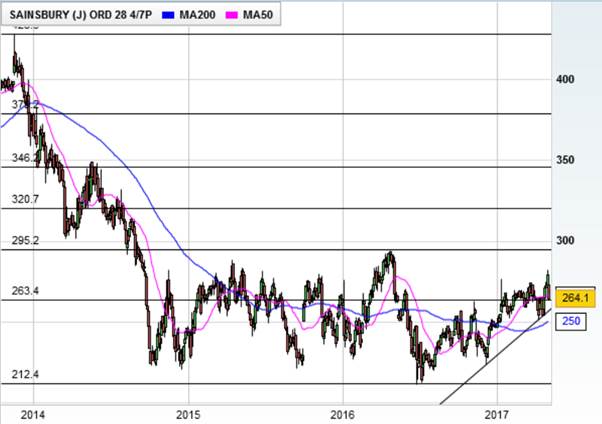Sainsbury's slashes dividend again as profits fall
3rd May 2017 13:16
Comedian Bill Bailey once described Argos's catalogues as "the laminated book of dreams", and is praying that allure continues as it makes last year's controversial acquisition pay off. Unfortunately, it hasn't prevented a third consecutive cut in the annual dividend.
Sainsbury's September 2016 purchase of Argos owner Home Retail Group has certainly made an immediate and dramatic impact, with the supermarket chain reporting a 12.7% jump in group sales to £29 billion in the 52 weeks to 11 March. Strip out the £3.2 billion from Argos and growth was just 0.4%. Like-for-like sales fell 0.6%.
It chipped in £77 million of underlying profit before tax during the 27 weeks under new ownership, too. But even with that help, group profit still fell 1% to £581 million as savings of £130 million failed to offset rising costs and in-store promotional activity.
No wonder chief executive Mike Coupe is "pleased" with progress since he bought Argos, a deal on which his reputation still hinges. Indeed, things have gone so well in the 59 Argos Digital stores opened in Sainsbury's supermarkets so far, plans to open 250 in total have been accelerated.
And Coupe predicts the grocer will deliver its promised £160 million of cash profit savings from the acquisition six months early.
Argos aside, there wasn't much good news for shareholders, as competition eroded retail margins by 32 basis points to 2.42%, and the company booked a pre-tax profit of £503 million - 8.2% down year-on-year if you add back Argos transaction costs and other one-offs.
Even more galling, the final dividend is slashed by 18.5% to 6.6p, giving a full-year payout of just 10.2p, down almost 16%. That's the results of Sainsbury's strict adherence to its policy of paying an "affordable" dividend covered two times by underlying earnings - down 10% to 21.8p this time.
While it's refreshing to see a board sticking to its word, and this was pretty much expected, investors will be miffed at the loss of income, which cuts the dividend yield to below 4%. It's part of the reason why Sainsbury's shares have slumped by 5% from yesterday's one-year high.

Net debt did reduce by £349 million to just under £1.5 billion and the company says it remains on course to deliver its three-year £500 million cost saving programme by the end of 2017/18. It will deliver a further £500 million of savings over the subsequent three years.
Coupe described it as a "pivotal year" for the company. "We have made significant progress delivering and accelerating our strategy," he said. He did, though, point to "challenging" conditions in the group's "core" food market.
Sterling's fall since the Brexit vote has increased import costs, and inflation here is starting to bite, putting pressure on shoppers' wallets. Competition in the sector has never been hotter, either, with discounters like Aldi and Lidl challenging the status quo.
John Ibbotson, director of retail consultancy Retail Vision, said Sainsbury's acquisition of Argos was "looking more inspired by the day" and has "proved an effective 'get out of jail' card". However, he said the supermarket must get its core business in order before it comes off its "catalogue crutches".
Still, long-time cheerleader UBS is still positive on the stock as, on many metrics, Sainsbury's actually beat consensus expectations. The broker therefore keeps its 'buy' rating but nips 10p off its price target to 350p.
"At our target, Sainsbury's would trade at 15-12 times EV/EBIT (FY18-20E) versus its three/five-year average of 11 times," analyst Daniel Ekstein said.
The value of an investment may fall. The investments referred to in this article may not be suitable for all investors, and if in doubt, an investor should seek advice from a qualified investment adviser.
Editor's Picks